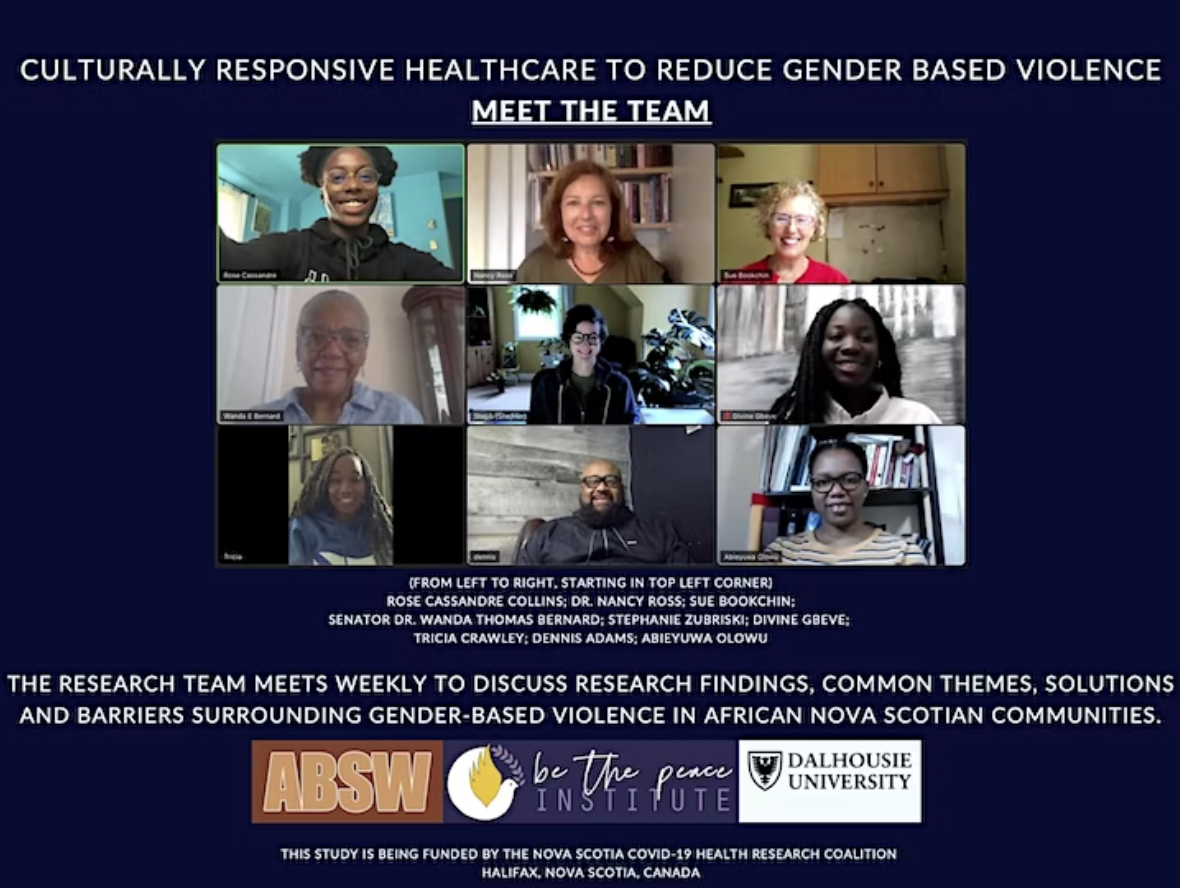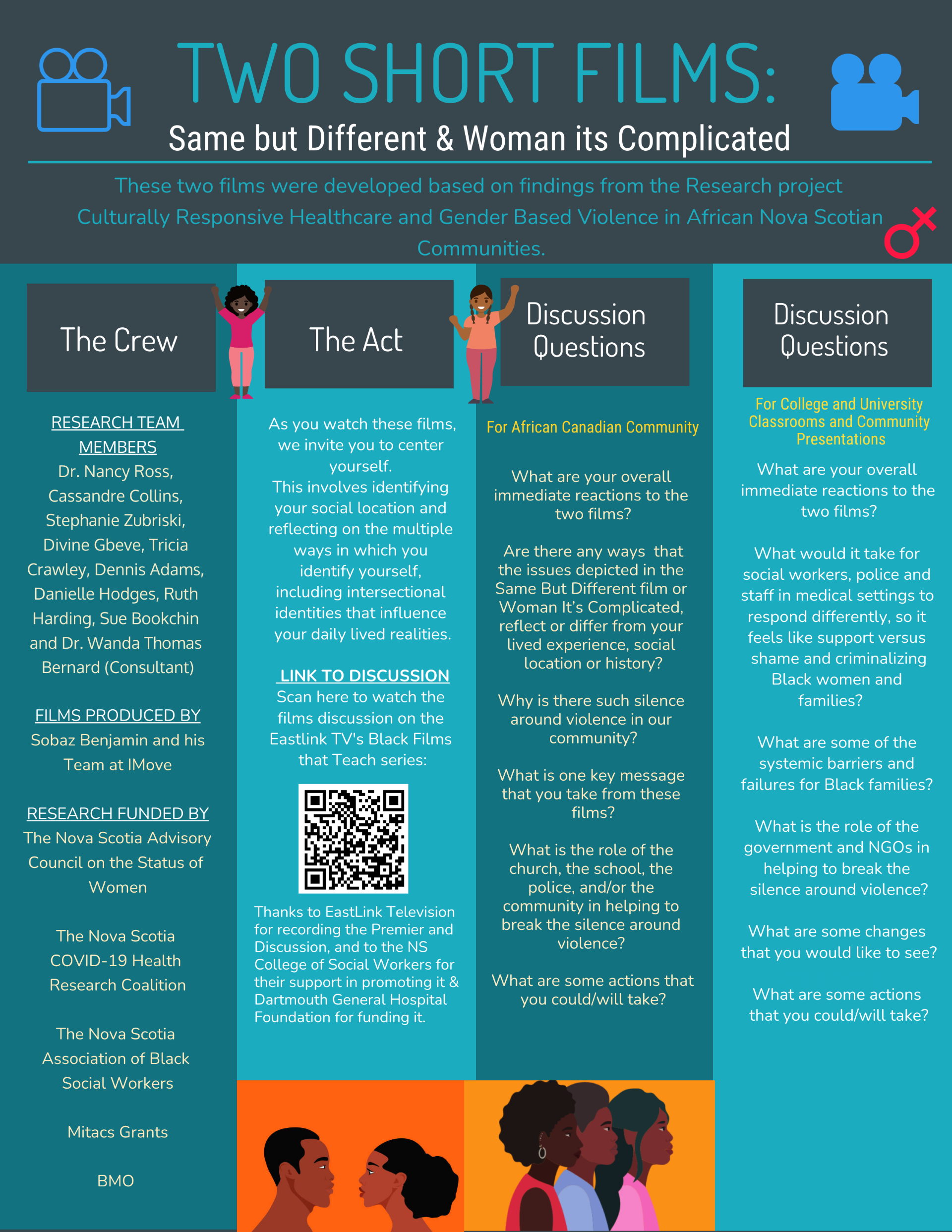Culturally Responsive Healthcare to Address Gender-Based Violence Within African Nova Scotian Communities:
April 2020 - January 2023
Using Africentric Research to Explore Culturally Responsive Care
Funding for Research Activities: The Nova Scotia Covid-19 Health Research Coalition - (The Dalhousie Medical Research Foundation); The Nova Scotia Advisory Council on the Status of Women; Mitacs Research Training Awards
Funding for Knowledge Dissemination: The Nova Scotia Association of Black Social Workers; The Nova Scotia Advisory Council on the Status of Women; Dartmouth General Hospital Foundation; The Progressive Senate Group
In-kind support was received from: Dalhousie University; The Nova Scotia Association of Black Social Workers
In partnership with:
Dr. Nancy Ross, (principal investigator), Dalhousie University School of Social Work
Dr. Wanda Thomas Bernard, Honorary Member of the Association of Black Social Worker
Sue Bookchin, Executive Director, Be the Peace Institute
Dennis Adams, Executive Director, Leave Out Violence NS
This project sprang from established partnerships and prior research that acknowledged the barriers faced by African Nova Scotians in accessing care after gender-based violence. Applying an Africentric lens to health and social services highlights institutional and service paradoxes and unearths meanings of “culturally responsive care”.
The purpose of this project is to increase our knowledge about the steps needed to inform social and health systems innovation to better support African Nova Scotians who experience family violence. As noted by Peterman et al. (2020) pandemics create times of uncertainty that are linked to a myriad of risk factors for increased violence against women and children. The impact of social and health inequities experienced by African Nova Scotian communities are compounded by the pandemic leaving them particularly vulnerable from both a health services and social outcomes standpoint with potentially dire social consequences.
The research scope includes ways in which systems can mobilize to make culturally responsive care an integral component to health and social services.
Methods:
Literature review, with particular attention to the work of Ruth Riviere on Africentric Canons
Kitchen Table Talks with members of NS African Nova Scotian communities
Surveys from health and social services providers
The research team will generate themes from the qualitative data from community participants and will generate demographic statistics and themes from data from professional participants via surveys.
The research will also build upon two substantive related research projects illustrative of a dangerous confluence of factors for Nova Scotia’s African heritage populations at this time, namely: the complexity of gender-based violence and Adverse Childhood Experiences (ACEs) in African Nova Scotian communities and the foundational social and health inequities faced by these same communities; and the compounding impact of a pandemic that mandates stay at home orders that effectively confine women and children at home with an abusive partner/family member without relief.
The first project, titled “Pathways to Justice” a project funded by Women and Gender Equality Canada (WAGE) was a 3-year partnership between the Association of Black Social Workers (ABSW) and Be the Peace Institute (BTPI) that focused on understanding and amplifying what justice means for women experiencing gender-based violence. A unique feature of this allyship project was the Kitchen Table Talks, facilitated by ABSW, to enable dialogue within the African Nova Scotia Community. By engaging 60 African Nova Scotian women in discussion about what was needed to respond better to gender-based violence, we learned that the majority of women who engaged in these talks acknowledged that most African Nova Scotian women do not report experiences of violence. As well there is a general mistrust of systems where they often do not see workers who look like them or understand the complex cultural dynamics in ANS communities, and where ANS men are treated more harshly and in racially biased ways by policing and justice systems. Their list of recommendations included a desperate need for culturally appropriate programming, resources and services specific to the African Nova Scotian community.
The second project, titled “Weighing Justice in Nov Scotia: Do pro-arrest, pro-charge and pro-prosecution policies remain the most effective response to domestic violence in Nova Scotia?” is a two-year project funded by Justice Canada, awarded to Dr. Nancy Ross, School of Social Work, Dalhousie University. A key finding of this project (which included a scoping and systematic review of all relevant literature) was that those who are socially, racially, and economically marginalized in Canada are more vulnerable to experience the negative impact of these policies and in general less likely to have their needs met within carceral and criminal justice responses.
Many feminists and particularly feminists of color, offer alternatives to carceral responses and reliance on law enforcement that include restorative and transformative community interventions. Health care sites, including mental health and addiction services, could offer unique community locations that intervene early in response to family violence that includes both gender-based/intimate partner violence and violence experienced by children.
Further, over 2000 peer reviewed journal articles describe the physical and mental health impact of adverse childhood experiences (ACEs) including witnessing domestic violence, racism and other forms of trauma throughout the lifespan (Felitti et al. 1998; Bellis et al. 2019). The association between ACEs and the development of physical health and psychosocial issues, including either becoming a victim or perpetrator of gender-based violence, across the lifespan, has been well established (Hughes et al., 2017). A number of studies have demonstrated that intervention programs can reduce these negative life term consequences of ACEs in adults and incorporate elements that promote intergenerational healing (Korotana et al. 2016).
Collectively these projects validate an urgent need for innovation to create better health and social responses to gendered violence that meet the needs of African Nova Scotians.
Project Objectives:
This project will explore in what ways health and social systems can better respond to family violence within the African Nova Scotian communities by exploring the following questions:
1) How will new learning from the impact of Covid 19 inform social policy and healthcare measures to better respond to gender-based violence within the African Nova Scotian communities?
2) What cultural and structural factors contribute to experiences of family violence within the African Nova Scotian community?
3) How can health care systems incorporate culturally appropriate programming, resources and services to support better responses to GBV in African Nova Scotian communities?
4) What principles are required to guide innovative policy and health systems innovation to become effective in responding to adverse childhood experiences and gender-based violence within the African Nova Scotian communities?
Anticipated Outcomes:
1. Increase knowledge about protective measures required during the pandemic to decreased violence against women and children, particularly within the African Nova Scotian community.
2. Heighten the visibility and ‘voice’ of African Nova Scotian communities in relation to addressing violence against women and children.
3. Contribute to the development of systems of healthcare that are responsive to race, adverse childhood experiences and trauma.
4. Develop principles that will guide culturally informed social and health system delivery specific to the African Nova Scotian Community.
Knowledge Mobilization to Date:
Project approach and findings have been shared with -
· Association of Black Social Workers Community
· NS College of Social Work
· Canadian Association of Socil Work Educators
· Be the Peace Institute AGM
· DEI Committee, Dalhousie University
· School of Social Work
Early coverage of this project in Dalhousie University News.
In this video Senator Dr. Wanda Thomas Bernard introduces the viewer to central concepts related to Africentric research and analysis. This approach guided our work that explored culturally responsive healthcare and social service responses to gender-based violence. Our findings revealed that experiences of racism emerge as the primary issue needing to be addressed within these systems.
In this video Dr. Nancy Ross interviews Senator Dr. Wanda Thomas Bernard who invites a call to action to end both anti-Black racism and gender-based violence.
Phase 2: Moving Forward Together
Phase 2 of the Culturally Responsive Care (CRC) project is a 3-year partnership with Dalhousie School of Social Work through Dr. Nancy Ross, Gen 1 Leadership - lead, Folake Awoyiga, and the NS Association of Black Social Workers with Dr. Wanda Thomas Bernard, follows on the CRC project to develop training modules and materials for health and social service providers in culturally responsive/adept services for people of African descent.
To date a large team of research assistants/community story tellers has been hired and oriented. Data analysis continues, using Africentric principles.
You can check out the films on Eastlink TV Black Films that Teach Series - Same but Different & Woman It’s Complicated: https://youtu.be/HCKuKrpKDXo
And check out the accompanying infographic highlighting the research project, team members, and some discussion questions to move the conversation forward on culturally responsive healthcare to gender-based violence and intimate partner violence with the African Nova Scotian communities.



